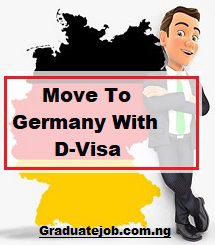Thinking of moving to Germany? Well, I’ve been there and got the D-Visa to prove it! Moving to a new country can be daunting, but it’s easily achievable with the right information and guidance. In this article, I’ll walk you through how to move to Germany with D-Visa.
So, if you’re ready to embark on this exciting journey to Germany, join me as we explore essential information on the D-Visa. Let’s get started!
READ MORE: Austria Job Seeker Visa – MOVE TO AUSTRIA FOR FREE
What is a German D-VISA?
The Germany D-Visa is a long-stay visa that allows you to enter and reside in Germany for more than 90 days for different purposes. It is a precursor to getting a residence permit once you move to Germany.
With the D-Visa, you can explore various employment opportunities, pursue education, or join your family members in the country. With its diverse options, the D-Visa opens doors for people seeking to build a life in Germany. In addition to stay in and experience Germany, the D visa is valid for short stays with other Schengen countries.
Who Needs A German D Visa?
Non-EU/EEA citizens planning to stay in Germany for over 90 days need a German D Visa. Whether for employment, education, or joining family members, the D Visa is essential for non-EU/EEA citizens to legally reside in Germany for a long period.
If you are a European Union citizen like Iceland, Switzerland, Norway, Liechtenstein and Norway, you don’t need a visa to enter Germany for any purpose.
Citizens from these countries are exempt from the German D-Visa:
- Australia
- EU/EEA /EFTA countries
- Israel
- Canada
- Japan
- New Zealand
- South Korea
- United States
Various Types Of Long-Stay German Visas
Here are other types of long-stay visas you can use to enter Germany:
1. Germany Visa For Long-Term Employment
The German long-stay employment visa is for skilled workers that can add value to the economy of Germany.
The immigration German authorities established this type of visa for the sole purpose of working thus giving internationals the chance to work in the Federal Republic for long terms.
Hence, if your sole intention of traveling to Germany is to work, you should consider this option.
2. Germany Visa For A Family Reunion
Are you going to Germany for family reunion? Then, consider this type of visa. This visa is for those outside the European Union countries who wants to join their family members in Germany as dependents.
Those relatives you plan to join must have permits for residence also there must be enough room for you and sufficient and secure finances.
3. Germany Study Visa
If you are a Non-EU country student intending to study in Germany, then this visa is for you. This visa is usually valid for 2 years.
To apply you must be accepted by the state or state-approved university, and be able to support yourself during the period of studies. Foreign students can work for up to 120 days or 240 half days to do so.
4. Germany Long Stay Visa for Researchers
The researcher’s visa is for highly qualified professionals. If you are a scientist, researcher or teaching staff visiting Germany for Research, you can apply for this visa. It is not required for you to have a German Language ability.
5. Germany Job Seekers Visa
You can apply for Germany job seekers visa if you are looking for a job in Germany. It is valid for up to six months and you can find a job within this period.
To have this visa you must have a higher education diploma recognized in Germany and the means of subsistence to support yourself during your stay. When you find a sustainable job you can apply for the EU Blue Card or a Residence Permit in Germany.
6. Freelance Self-Employment Visa In Germany
If you wish to work as a freelancer in Germany, then you must have a visa that allows you to stay in Germany for a longer period.
As you apply you must prove your possession of the necessary means to prove a project, support yourself and permit to exercise that profession. If you are above 45 years old, you must prove you have adequate provisions for old age.
READ MORE: Job Seeker Visa – Find Work in Europe
Required Documents For Germany Long Stay Visas
For a Long Germany visa application, you will need to have the following documents at hand:
- The Germany National Visa application form. The application form can change but that depends on the country. Fill out the application with the correct information about yourself and the purpose you are travelling. It is required to make use of capital letters.
- Evidence of sufficient financial means during the period of stay. The European Commission’s information, the applicant applying for this visa must be able to prove €853 monthly to the Embassy or consulate during their stay in the German territory.
- If you intend staying with friends/relatives, you have to submit their identification card and passport to show as evidence that they can support your stay in Germany.
- If you are employed, you need a letter from your employer to confirm that you are in a working relationship.
- If you are a student you will get a letter from your school that you enrolled on college/university. if you are self-employed you will need to have the official documents that confirm your business.
- Proof of your civil status like the birth certificate of children, marriage certificate, death certificate of spouse or relations etc.
- You will have to provide a health insurance certificate from Germany.
READ MORE: Sweden Job Seeker Visa – How to Apply
Conclusion
Do you desire to travel to Germany to work, study or visit family? Don’t panic make sure you get the necessary documents you will need to apply for the D-visa. Don’t waste time on it, this is an advantage for you!






